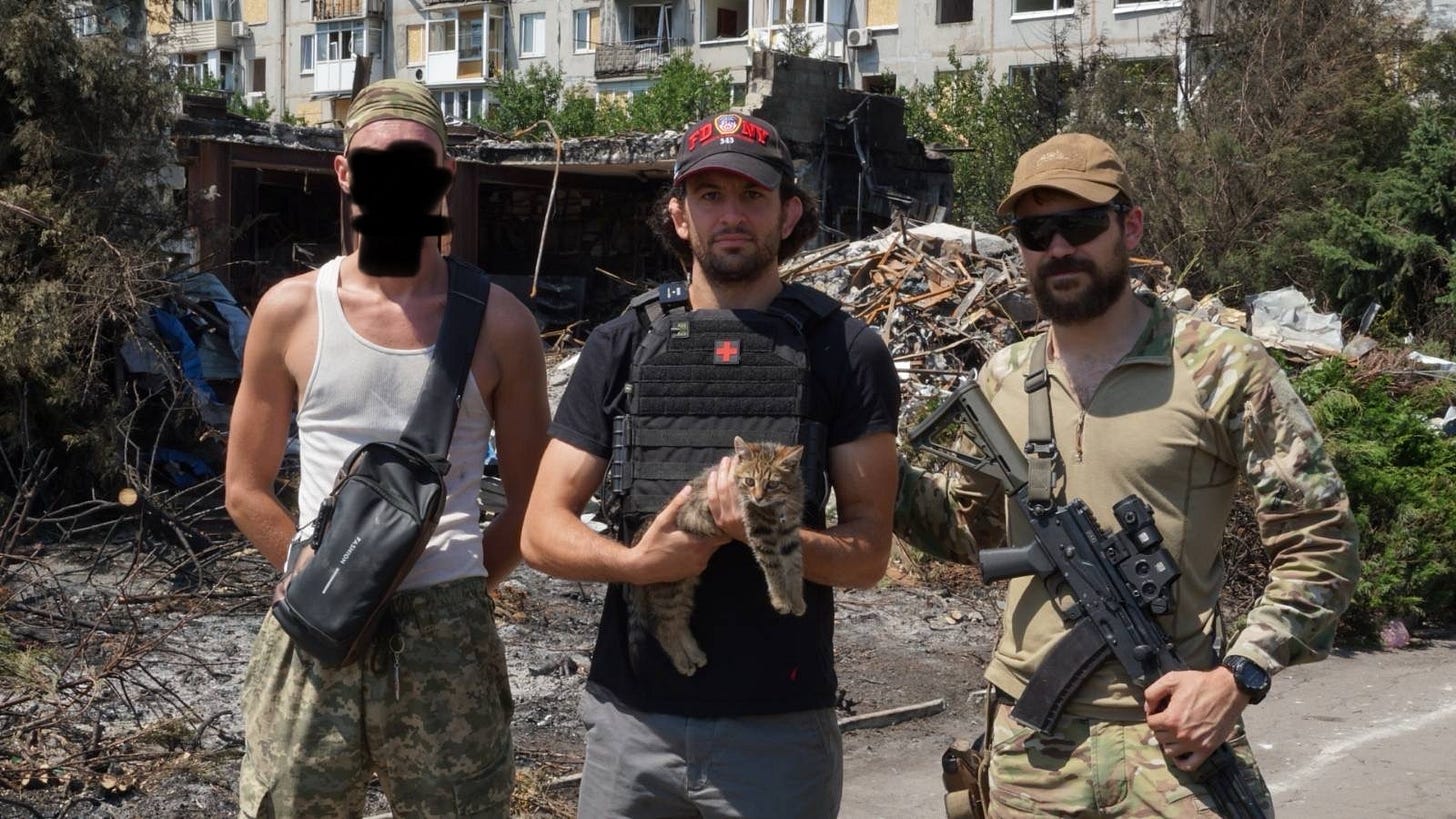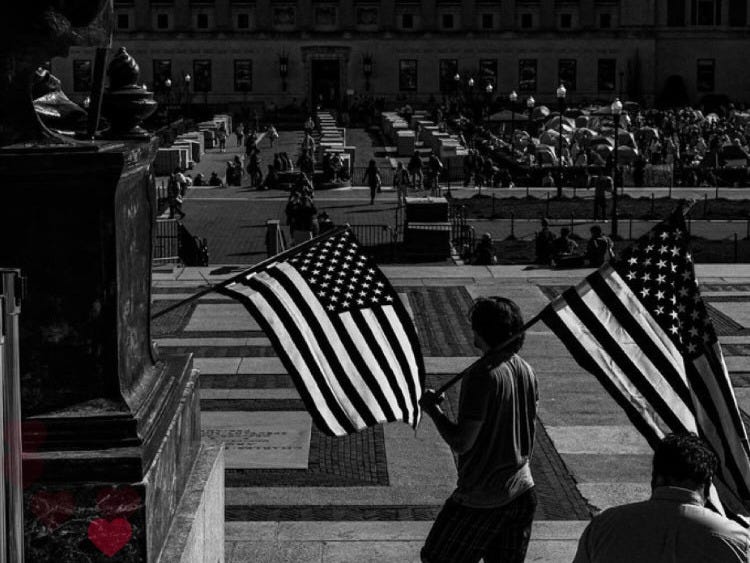Summer Offensive: A Veteran's Perspective on Columbia’s Civic Culture
In Ukraine, I experienced comfort in a war zone. At Columbia, I experienced hostility for carrying the American flag.
This summer, I purchased a package of tourniquets and boarded an eleven-hour flight to Poland, followed by a fifteen-hour train ride to Ukraine. Officially, it was a humanitarian trip to help civilians bombarded by ballistic missiles and provide aid to the frontlines. Unofficially, it was something else. I needed clarity. I needed to feel useful. And I needed to escape the version of myself unraveling in New York City, where the campus I once considered my greatest achievement had started to feel like enemy territory.
I love my country. I love my school. But I no longer recognize them. And that scares the hell out of me.
I came to Columbia because I believed it was a place where hard work met a sense of purpose. I had served in the United States Air Force prior to my admittance. As a result, my academic skills were rusty. It took everything I had to create a résumé that met Columbia’s standards. Full-time classes, part-time jobs, admissions essays, and endless nights of doubt all shaved years off my life. When the acceptance letter came, I cried tears of joy for the first time in a decade.
Now, entering what could be my last year at Columbia, I’m known for being one of the “problem students.” Not for misconduct or poor grades—I made the Dean’s List three times—but because I waved an American flag on campus.
During the encampment protests on April 22, 2024, a veteran and friend of mine was assaulted outside Low Library. Several veteran and non-veteran students responded by waving American flags. Faculty members came and thanked us, some students joined us, and some flipped us the bird. Some outlets called us white nationalists, some called us patriots. I just wanted my friend to feel less lonely.
Afterwards, I gave interviews and even appeared on Fox News to give my stance on the situation, only to open my inbox later that evening and see it filled with both support and vitriol. Over the next few days, as I walked into my usual classes, some of my classmates stared at me with contempt while others showed appreciation. Regardless, I knew what I was getting myself into; this has been a contentious subject on campus with the political temperature at an all-time high.
What bothers me, however, is how I have since felt more at ease in a country under siege.
I spent three weeks in Ukraine, not just to deliver aid, but to experience firsthand what it is like to be in a war zone. During my six years in the Air Force, I served as an unmanned sensor operator, flying 2,700 combat hours in the MQ-1 Predator and MQ-9 Reaper. In layman’s terms, I flew drones from a cockpit in Las Vegas. I had fired missiles into several war zones but had never been to one. I felt as though I owed it to myself to know what it was like to be on the other end of the stick.
In Kyiv, air raid sirens howled like wolves. Buildings shook from missile strikes. And yet, the city thrived. Teenagers shared beers on public benches. Children rode ponies in the park. Restaurants and bars stayed open until curfew. And everywhere I went strangers greeted me with a warmth I hadn’t felt in years.
At a restaurant called La Casa, the staff remembered me from the day before—what I ordered, what I drank. They showed me pictures of their children. They laughed with me, toasted me, and trusted me. They didn’t care about politics or my past, and I don’t think they showed this level of hospitality because I was an American, or because they were doing their job as a restaurant. This was how I was treated everywhere. Kyiv, Kharkiv, Poltava, and Donetsk are cities that each contain their own unique cultures, but they all granted me one thing: respect.
Compare that to Columbia, where students and faculty members dress like jihadists, hijack classrooms, assault custodians, and scream “Intifada Revolution” in students’ faces. Where American flags are considered hate symbols. Where a student group posted photos of dead American troops and wrote, “Soon. Inshallah.” That was the world I left behind.
I don’t think the American press can truly capture this paradox: How is it that a country fighting against extinction is more welcome to American veterans than college campuses, despite a U.S. President who has been inconsistent in his support of Ukraine?
In Donetsk, I embedded with the 25th Airborne Brigade to deliver supplies to the frontline—a team full of Ukrainian and foreign fighters alike. One American I met, Tim, had joined after seeing footage of a hospital bombing. We talked about college football and life before the war. And the strange peace that comes from doing something that matters.
“I love it here,” he said. “I’m respected. Back home, I worked two jobs and couldn’t afford an apartment. Brother—here they respect you.” He kept mentioning that same word, respect. And all I could think was, why doesn’t it feel that way back home?
Let me be clear: Right now, it is objectively more dangerous and more difficult to be in Ukraine than in America. This isn’t an anti-Columbia piece, and it certainly isn’t an anti-America piece. In fact, it’s the opposite. I still love my country and my school, but both are in danger. We have forgotten how to talk to each other, how to disagree, and how to grieve together without the need to win a debate.
In Ukraine, I found no such confusion. Just people trying to survive and hold onto their humanity while the sky fell around them.
One of the last nights of my trip, Kyiv came under fire from an eight-hour drone assault. Yet the next morning, the city was still alive. People were back on the street. Kids were playing. The war hadn’t stolen their spirit.
Maybe that’s what I had really come to see.
I went to Ukraine in search of perspective, and I found it—not in politics, not in ideology, but in people. I found it in a waitress who handed me coffee after a bombing and then proudly showed me pictures of her children; in a little girl who passed the time in a bomb shelter by playing a board game; in a soldier who told me, with absolute certainty, “If shit goes sideways, I’m not leaving you.”
This year I will choose to remember and appreciate why I came to Columbia in the first place: to learn, to debate without fear, to disagree without forfeiting respect, and to trust my incredible professors to guide me into the future I’ve worked towards.
If we’re going to get back there—if we’re going to restore sanity on our campuses and rebuild trust in our institutions—it won’t come from students chanting in unison. It won’t come from faculty who exile colleagues for thinking differently. Yes, some ideas are too extreme to be given a stage. Some people may be too far gone. However, that cannot dictate whether we show each other the one thing every human being is owed: respect.
Respect begins with recognizing that everyone has a reason for being where they are. I’ve seen this truth in a war zone—in the hands that embrace after the ceiling caves in, in the strangers who make space for you in the dark, and in the promise of a soldier who will not leave you behind. And if those suffering under the shadow of artillery fire can still show respect to their neighbor, then we can do the same in the safety of a classroom.
Mr. Nahins is a student at Columbia School of the Arts studying Fiction Writing. He is a guest contributor for Sundial. Creative works include: A Choir of Crickets and Stage Names.
The opinions expressed in this article are solely those of the author and do not necessarily reflect the views of the Sundial editorial board as a whole or any other members of the staff.






CC/CBS alumnus here. You have more support from our community than you realize. Bravo. Keep going.
Just Brillent!!!!